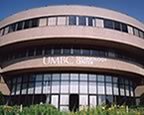|
||||||||||||||||||||||||||||||||||||
|
Well, while risky, it could be a lot of money for a private developer if you get the right companies. Most private developers do not take equity in companies. And so when they are doing a real estate project, they are trying to get a certain return between 10 and 15 percent a year. It is really quality investors who potentially can make a lot of money if the company does really well. The way the university has been able to do this is initially when we started our incubator back in the late 1980s, we operated out of inexpensive trailers on the main campus. And the university did a lot of the retrofit ourselves. We had a little bit of help from the state but this was a very small program at that point but we did spawn a number of successful companies including In Vitro Technologies and Receptor Biology. We were fortunate when this campus came on the market in 1996 that the state helped us buy it. And I think the state saw this as a great opportunity for UMBC to expand its incubator. And there was a lot of wet lab space in this building. Some of it was not being used as wet lab space so we had to put a little bit of money to put it back into use as wet lab space. But the basic infrastructure was here. This was a research facility. So it was a very smart investment from the state because it would have cost two or three times the amount of money to build this new. So the fact that we were able to buy it with the help of the state really was terrific. And that was what really enabled us to operate this program. Will UMBC be competing with the new research parks going up in Baltimore? To a certain extent we will. We have, I think, 12 biotech companies here. Over 40 percent of our space is leased to biotech companies. Some of them are involved in working on Johns Hopkins technology or University of Maryland, Baltimore's technology. So there will be some competition for those companies but I think the benefits of having those projects outweigh the short-term competition issues. And those projects are really going to help Baltimore be even more of an area that is focused on biotechnology and gives us more of that critical mass, which is very important. And so we are, I'm surprised that it has taken UMD and Hopkins as long as this to decide to go ahead with these projects. So I think in the long run we will all end up having our own niche. And we do have a fair amount of technology. Each year there is more technology at UMBC that is transferable and we will capture that technology. But I also think some companies will choose this location over an urban location. And that is a personal decision on the part of companies but we are obviously a different kind of project from that perspective. Your location is probably more convenient for transportation purposes and airport. We are so close to BWI — literally six minutes. We are closer to Washington and the work with the federal labs. Most of our companies do have business relationships or relationships with labs in the Washington area. Being right off of 95 is important. And having parking is also something — parking and safety issues are important to companies. So I think our location offers some plusses that an urban location does not. Could you see some of the I-270 companies opting for a Baltimore location? Yes, and we're actually starting to see that. We have companies more and more who are looking in the Baltimore area as well as the D.C. suburbs. One company in particular, Cognate Therapeutics, that is a venture-backed company. They were looking both in the Washington area and of course their fund is located in the D.C. suburbs. And they also looked up here and they decided to come up here. They had a few key people from the Baltimore region but it was really a big decision for them and they were fairly big, they rented 15,000 square feet here. But they are finding they love the location, they have been really happy with the kinds of employees they have been able to find and I think that the Baltimore area is not as congested and the cost of living is less. And so I think there are some good reasons to look at this area. And companies will be doing that more and more. We are really not far from D.C. So in terms of accessibility it is very accessible. When will your research park be completed? We hope it will be completed within the next five years. We don't have a whole lot of property that we are developing. We have 41 acres. We started the second building a couple of weeks ago and we have three more sites that we will be developing. We are talking to a couple of companies about one of the other sites right now and we expect as the economy picks up — and we trust that it is picking up — that we will be able to get that developed fairly quickly. We do have a private developer so in terms of having capital to build the buildings that is not an issue. It is more finding the tenants who fit well with our project and who are in the position to lease space. Do you ever turn any tenants down? We do. And here at the tech center we have a process that even though vacancies have gone up a little bit we invest a lot of staff time in companies that come into the incubator. And so we have turned away a number of companies that we don't think are ready either because of funding issues or we're not certain that there is really a market for their technology or because of the management team. We have developed an affiliated program so companies that are sort of on the fence but we think there is some promise but there are some gaps, we can work with them as an affiliate. And normally for a six to nine-month period if we can address some of those issues then we can bring them into the program. But we do turn companies down. At the research park we have covenants that are attached to the land and so any company that comes into the research park has got to abide by the covenants and so we are not leasing space to industrial companies. We don't lease space to professional service firms, call centers. We are really focused more on R&D companies or companies that are involved in education. And we also look for collaboration or potential collaboration with the university. And I think it is one of the reasons why research parks typically take a longer time to build out than a business park because there is a focus and there are some restrictions. But at the end of the day it is what makes these projects very exciting. The mission is partly economic development but it is also technology transfer and to enhance the research mission of universities like UMBC, UMB, Johns Hopkins. And that is a huge resource for the state. And if we can help facilitate that through these kinds of projects, it really is very important. Are you encouraged that the economic recovery will move the research park along a little faster? I am. Before the economy started really suffering, we were talking to several companies about built to suits at the research park and there was a lot of activity with prospects. And then quite frankly many of those conversations fell apart very quickly. The economy seemed to really go into the slumps, especially in the technology sector. But we are starting to see signs that that is coming around and obviously the stock market seems to be showing signs of strength. Venture capital investing is starting to increase a bit. And so the signs are there. And also, I'm noticing that there are more private sector folks who are getting into the tech transfer business. I've had several people in the last few months talk to me about whether they could work with us to try to develop businesses around technology being developed at the university. And so they are seeing a real business opportunity or otherwise they wouldn't be spending the time doing that. Do you have a vision for UMBC and technology? The real success is in the kinds of partnerships and relationships that are evolving because of these projects. And I think it would be wonderful if more and more of our students, more of our alums, more of our faculty were working with the entities that are located here at the tech center and over at bwtech. And ultimately I would love the university to continue to look for properties. At some point, the tech center will be built out and I think that there are opportunities beyond that to really do more of this kind of real estate value-added projects. |
|||||||||||||||||||||||||||||||||||
|
bwtech@UMBC Incubator and Accelerator • 1450 South Rolling Road • Baltimore, MD 21227 410.455.5900 • 410.455.5901 fax • techcenter@umbc.edu |
||||||||||||||||||||||||||||||||||||




